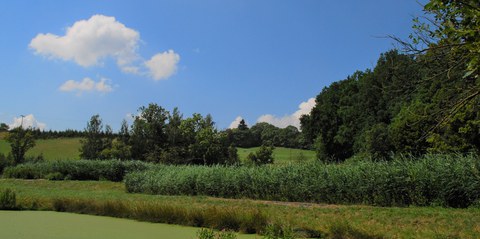Aug 04, 2021
The “Med-zeroSolvent” project aims to make the production of dialysis membranes more environmentally friendly
Optimized processes should save fresh water and energy and avoid wastewater and emissions
The “Med-zeroSolvent” project, funded by the Federal Ministry of Education and Research (BMBF) until the end of 2024 and with the participation of TU Dresden with its Institutes for Urban and Industrial Water Management and Hydrobiology, explores new approaches in medical water management. The scientists are interested in establishing innovative methods for wastewater-free production through the energy-efficient treatment of highly polluted process water from dialysis membrane production.
The starting point for the successful project acquisition was the joint collaboration between B. Braun Avitum Saxonia GmbH and TU Dresden in dealing with specific, practice-relevant issues in the area of the treatment of the resulting process water. This cooperation was continued after completion of the project by working on several final theses. The central question of the work consisted in the investigation of ways of increasing sustainability in the area of process water treatment. With the invitation to tender for the federal program "Water Research and Water Innovations for Sustainability - Water: N", there is now the opportunity to fundamentally deepen the approaches that have been developed so far.
Dialysis is one of the most important forms of kidney replacement therapy. There are currently around seven million dialysis patients worldwide. The need for dialysis will continue to rise, on the one hand as a result of the increase in acute and chronic kidney diseases, and on the other hand due to the improvement in therapy conditions in industrialized countries as well as in developing and emerging countries, with the latter having a lot of catching up to do.
Dialyzers used for renal replacement therapy contain dialysis membranes that are mainly made from synthetic polymers. During the production process, nitrogen-containing solvents such as N, N-dimethylacetamide (DMAc) or N-methylpyrrolidone (NMP) are used. A large part of the solvents is recovered internally, for example by distillation processes. However, concentrates and wastewater containing solvents are still produced, some of which are thermally disposed of in external treatment plants with a high expenditure of energy.
Due to the growing importance of dialysis, both the need for resources for the manufacture of dialyzers and the need for treating the residues are increasing. The focus of the Med-zeroSolvent project funded by the BMBF is consequently on the investigation of possibilities for reducing the emissions resulting from wastewater and concentrate treatment and in reducing the demand for freshwater.
The main project goal is the development of an energy-optimized, multi-stage process for the treatment of solvent-containing process water from membrane production, with the possibility of recirculating treated process water back into the production process. In addition to biofilm and membrane processes, adapted, natural treatment processes are an essential core element of the process combination to be developed. In order to save freshwater, the second component, in addition to the recycling of treated wastewater, is the management of rainwater. The consistent implementation of measures at the source, i.e. the on-site treatment of the process water in a company sewage treatment plant, prevents environmentally critical substances from being shifted to municipal sewage treatment plants. The focus is on the monitoring of the chemical substances used in the production process and their primary degradation products, but also the evaluation of the treated wastewater through ecotoxicological studies.
The development of a low-energy process combination in connection with the saving of truck transport routes, the partial substitution of drinking water, the reuse of waste heat generated in the manufacturing process and the use of concentrated process water flows for energy generation leads to a reduction in carbon dioxide emissions.
"The Med-zeroSolvent project is well-rounded," summarizes coordinator Prof. Peter Krebs, head of the Institute for Urban and Industrial Water Management at TU Dresden. “Using a concrete example of industrial process water, all aspects of avoiding and reducing emissions are examined and evaluated - from provision to internal recycling and wastewater treatment to ecotoxicological assessment with regard to water pollution. And this under the premise of energy optimization and natural processes. The approach can thus be transferred to other branches of industry."
In addition to B. Braun Avitum Saxonia GmbH as a producer of dialyzers, the project consortium includes several companies in the field of plant construction and planning (DAS Environmental Expert GmbH, Me-Sep, wasserWerkstatt Ingenieurbüro für ecological water management), a laboratory company (CUP Laboratorien Dr. Freitag GmbH ) as well as a public research institution with TU Dresden and a private research institution with the Institut für Luft- und Kältetechnik gGmbH. The project is led by the Institute for Urban and Industrial Water Management at TU Dresden.
Weitere Informationen unter https://www.medzerosolvent.de.
Information for journalists:
Dr.-Ing. Thomas Schalk
Institute for Urban and Industrial Water Management
Tel.: 0351 463-33684


